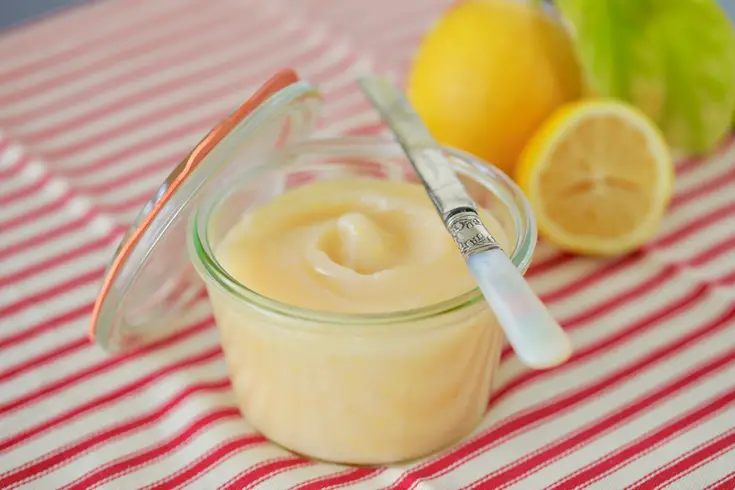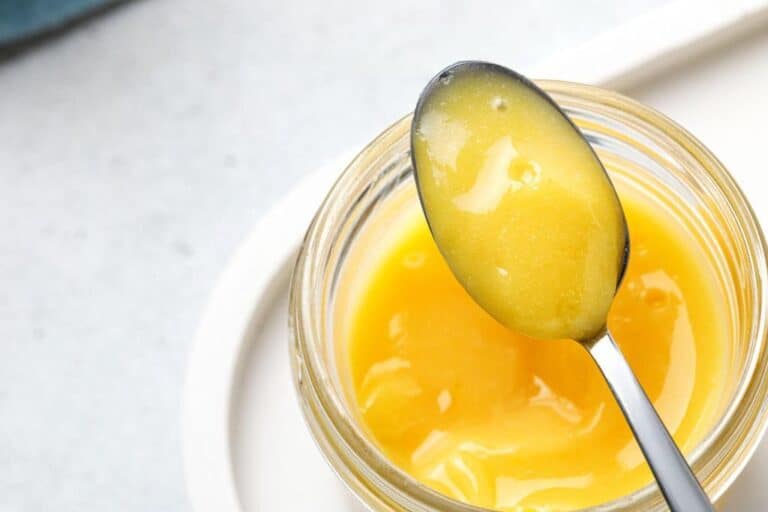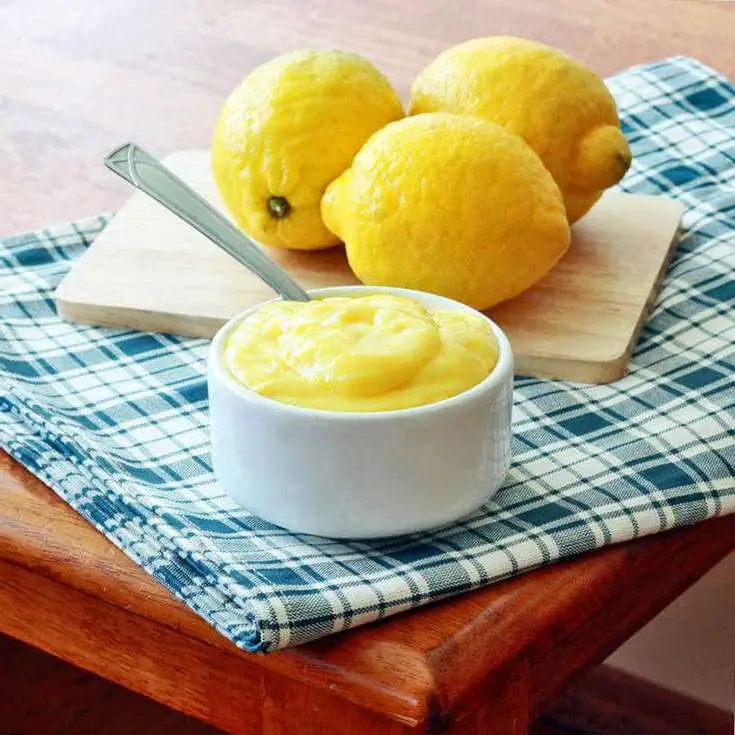How to Store Lemon Curd to Make It Lasts Longer?

Welcome to the delightful world of preserving and storing lemon curd. Lemon curd is a delicious and tart spread that can be used in a variety of ways, from topping toast to filling tart shells. While store-bought lemon curd can be expensive, it is easy to make at home using just a few simple ingredients.
In this culinary journey, we unveil the secrets to storing lemon curd for extended enjoyment. From the ideal containers that shield its citrusy essence to the perfect temperature haven in your kitchen, we’ve got you covered.
Stay tuned to this article for additional information on how to store lemon curd so it lasts longer. We are also discussing the best method to preserve lemon curd.
What is Lemon Curd?
The name “lemon curd” must be intriguing to you, but what is it exactly? Also, how is lemon curd made?
Lemon curd is a type of spreadable custard perfect for pastries and tarts. It is similar to jam but has a much more intense lemon flavor. It is made from lemon juice and zest, eggs, zest, sugar, and butter. The mixture is cooked over low heat until it reaches the ideal lemon curd thickness.
When afternoon tea was offered in England in the late nineteenth and early twentieth centuries, it was usually served with toast or scones. Lemon curd is normally used to replace jam. Other than that, this fruit curd may be used as a filling for cakes, mini-pastries, and tarts.
Lemon curd was traditionally made in small amounts due to its short shelf life compared to jam. In modern times, refrigeration has made it feasible to produce and store larger quantities.
There is no need to worry about lemon curd going to waste, no matter how or why you leave it out. As shown below, lemon curd can be stored in three different ways to make it last longer.
Read: Here’s What Does Lemon Curd Really Tastes Like
How to Store Lemon Curd to Make It Lasts Longer?
Store Lemon Curd in the Refrigerator
If you’re not ready to use your newly made lemon curd right away, you can just put it in the refrigerator.
It’s best to keep it in a firmly sealed glass or plastic container so that it doesn’t contaminate other foods in your fridge. When kept in the refrigerator, lemon curd can last for up to two weeks. It should be put in a well-sealed container, fresh lemon container for up to two weeks.

Store Lemon Curd Using the Water-Bath Canning Method
This process involves boiling jars of lemon curd in water for a specific amount of time. When done correctly, water-bath canning will create a vacuum seal that will prevent bacteria from entering the jar and spoiling the lemon curd.
Using the water-bath method of canning, you may preserve lemon curd by sealing the jars and storing them in the refrigerator. Why do you need to do so? Fresh lemon juice’s acidity levels can be difficult to determine, which is why canning lemon curd recipes require bottled lemon juice. And who wants to create their own lemon curd out of commercial lemon juice?
Unopened canned jars can be stored in the refrigerator for up to three months. The jars must be consumed within a week after being opened.
According to the information I discovered, canning lemon curd is risky since the acidity may not be strong enough to prevent bacterial development in the butter and eggs.
Commercial canned lemon curd is safe because it is manufactured at greater pressures and temperatures than can be achieved at home.
Store Lemon Curd in the Freezer
Lemon curd can be frozen! You may store your fresh curd in an airtight, freezer-safe container as soon as it has cooled.
The lemon curd will keep for up to a year in the freezer. Make a note in your calendar so you don’t forget your favorite curd delicacy.
The night before you plan to use it, place the frozen lemon curd in the refrigerator to thaw out overnight. Like anything you put in the freezer, it needs time to thaw, ready to be served.
Never Freeze Lemon Curd When It Is Still Warm
When freezing lemon curd, it is important to remember to never put it in the freezer when it is still hot or warm.
There are two reasons why this is not a good idea.
- To begin with, doing so may cause bacterial development in the lemon curd, which might lead to health problems if eaten later.
- Putting hot food in the freezer lowers the temperature of the freezer. This isn’t good for the items you currently have in your freezer.
Allow the curd to cool completely before transferring it to the freezer. To expedite the procedure, divide it into sections.
Freezing Lemon Curd in Smaller Portions
It’s always a good idea to freeze lemon curd in smaller batches if you plan to use it at some point in the near future.
Lemon curd can take a long time to thaw if it’s frozen in large amounts.
Lemon curd, on the other hand, should be consumed as soon as it has been defrosted as possible. If you keep it out in the cold for a long time, it will spoil. Why bother freezing your lemon curd if you won’t be able to enjoy it in the way that it was meant to be enjoyed?
It’s best to freeze lemon curd in smaller quantities when you live alone or know you won’t finish a jar in a few days.
Use an ice cube or freezer tray to dish out the lemon curd before freezing it. The ones with more portions are the best.
What to Do With Leftover Lemon Curd

There are so many delectable alternatives when it comes to lemon curd, including fresh, water-bath canned, or even frozen. So if you have leftover lemon curd, don’t waste it.
Pour it into a pie or tart shell and bake it until golden brown. Dessert is ready to be served.
A cookie crust, such as a traditional Graham cracker or gingersnap crust, or a shortbread tart crust are all good options. Keep the whipped cream on hand for finishing touches.
Also delicious smeared over cookies, cakes, biscuits, or scones; swirled into ice cream or yogurt; served with fresh fruit; or simply eaten straight from the jar, lemon curd is versatile and easy to make.
Can Lemon Curd Be Left at Room Temperature?
The short answer: no; it’s not advisable to leave lemon curd at room temperature for an extended period. Why, you ask? Well, it’s all about safety and taste. Lemon curd, with its high sugar and moisture content, is a breeding ground for bacteria when left unattended in the warmth of your kitchen.
For optimal preservation, the refrigerator is its sanctuary. This ensures a longer shelf life and maintains its luscious texture. Airtight containers, like glass jars, are your allies in warding off unwanted flavors and maintaining that citrusy punch. The chart below summarizes the dos and don’ts, ensuring your lemon curd stays a delectable delight.
| Storage | Room Temperature | Refrigeration |
| Duration | Short periods | Extended shelf life |
| Container | Avoid | Airtight (glass jar recommended) |
| Flavor | May alter over time | Preserves vibrant taste |
What Is the Best Way to Preserve Lemon Curd?
Preserving the zesty delight of lemon curd is a culinary art. Start by choosing an airtight container to shield it from air and moisture, key culprits in flavor deterioration. Glass jars with tight-fitting lids are excellent candidates. Ensure the curd fills the container to minimize air exposure.
Secondly, refrigeration is your ally. Store the jar in the fridge, preferably on the top shelf, where the temperature is consistent. This prevents the curd from getting too warm or too cold, maintaining its smooth texture and vibrant flavor.
To enhance longevity, label the jar with the date of creation. This simple step ensures you savor the lemony goodness at its peak freshness. Following these steps, your lemon curd becomes a time-traveling treat, ready to whisk you back to the sunny days of its creation.
Read: Lemon Curd Substitute: Try One of These Six Options
How Do You Know If Lemon Curd Has Gone Bad?
If you’re not sure of the lemon curd’s condition, then check it shortly after it’s been defrosted. You may smell it, inspect the texture, and, last but not least, taste it to see whether the flavors are the same as they were before it was frozen.
| Because of the acidity in lemons, lemon curd has a long shelf life. However, it is difficult to say how long lemon curd will last. The lemon curd will not spoil if stored at the right temperature and in a well-sealed container. |
Final Thoughts
In conclusion, lemon curd is a delicious and versatile spread that can be used in many ways. It can be enjoyed on its own or added to cakes, cookies, or other desserts. It can also be used as a condiment on toast or pancakes.
Lemon curd can last for up to two weeks when stored in the refrigerator and up to a year if you freeze it in the freezer. Make sure to keep it in an airtight container and to avoid exposing it to warm temperatures.
FAQ
Can I make lemon curd at home?
Absolutely! Crafting homemade lemon curd is easy with fresh lemon juice, lemon zest, egg yolks, and a simple thicken-and-cook process.
What is the best way to thicken lemon curd?
Use a double boiler to gently cook the curd, stirring constantly. It thickens as the egg yolks and sugar interact.
How do I store homemade lemon curd?
Refrigerate the curd in an airtight container. For longer storage, freeze it, ensuring it thaws in the fridge.
Can I use a food processor to make lemon curd?
Stick to a double boiler for the best results; it allows precise control over the cooking process.
What’s the role of the National Center for Home Food Preservation in lemon curd making?
The center provides reliable guidelines on preserving homemade goods, offering valuable insights for lemon curd enthusiasts.
How long does it take to make lemon curd?
With a simple recipe, you can whip up lemon curd in about 20 minutes. The key lies in consistent stirring.
Can I freeze lemon curd?
Yes, lemon curd freezes well. Ensure it’s in a sealed container and thaw in the fridge for the best results.
What’s the secret to the best lemon curd recipe?
The magic lies in the balance of tart lemon flavor, the right consistency, and a touch of sweetness.
How do I know if my lemon curd is done cooking?
Coat the back of a spoon with the curd; if it holds a line when you run a finger through it, it’s ready.





